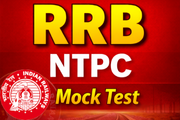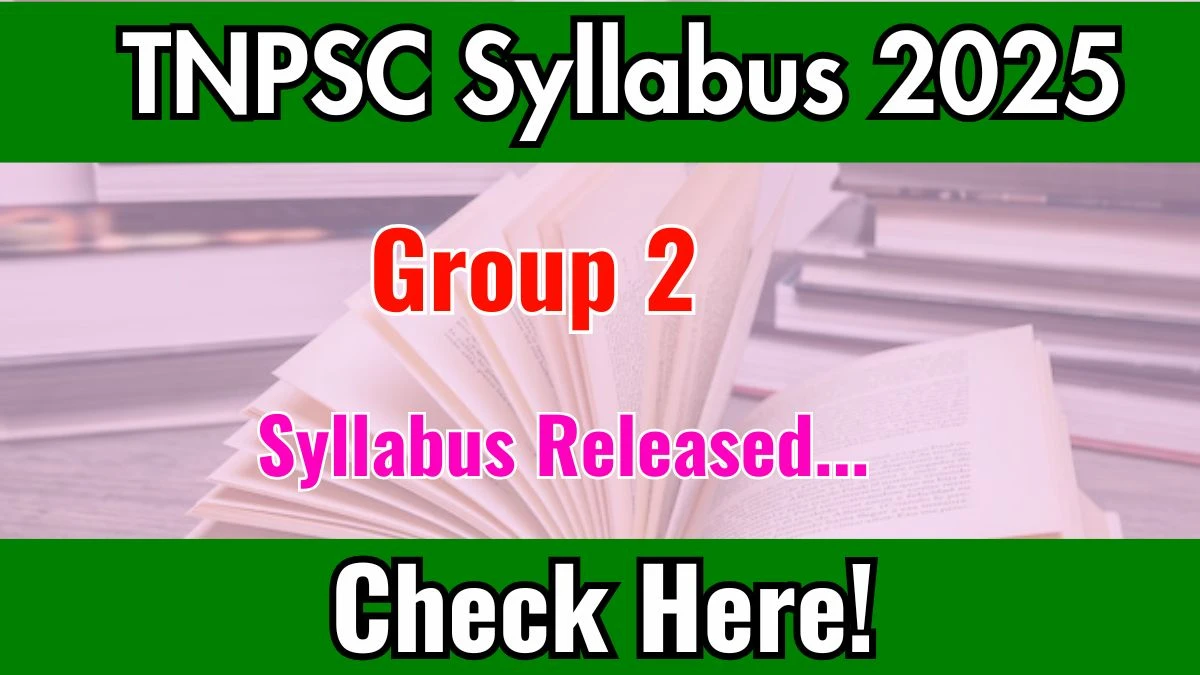TNPSC Group 2 Syllabus 2025 Overview
The Tamil Nadu Public Service Commission (TNPSC) has published the official syllabus and exam pattern for the Group 2 recruitment exam. To ensure a well-structured study plan, candidates aiming for the TNPSC Group 2 exam should thoroughly review both sections of the syllabus. Understanding the detailed syllabus and exam structure is essential for effective preparation.
| Conducting Authority | Tamil Nadu Public Service Commission (TNPSC) |
| Name of the Exam | TNPSC Group 2 |
| Selection Process |
|
| No.of Questions | Prelims : 200 Mains : 200 |
| Duration | 3 hours |
| Total Marks | Prelims : 300 Mains Paper : 300 Interview : 40 |
| Negative Marking | No Negative Mark |
| Official Website | tnpsc.gov.in |
TNPSC Group 2 Prelims Syllabus 2025
The syllabus is an important part of your exam preparation. It lists all the topics you need to study, helping you focus on what’s important. To do well in the TNPSC Group 2 exam 2025, make sure you understand the syllabus fully. It covers both general subjects and specific topics related to the post. Use the syllabus to guide your studies and ensure you're covering everything needed for the exam.
| Subject | Topics |
|---|---|
| General English – Grammar (Part A) | Phrases, Synonyms, Antonyms, Prefix & Suffix, Fill in the blanks, Prepositions, Tenses, Voice, Homophones, Error Detection, Comprehension, Odd One Out, Word Formation, Sentence Identification, Compound Words |
| General English – Literature (Part B) | Figures of Speech, Poetry Appreciation, Notable Lines from Poems, Biographies of Renowned Personalities, Works of Shakespeare & Oscar Wilde, Dr. Karl Paulnack's Essays, Motivational Comprehension Passages, British vs. American English, Descriptive Comprehension on Places |
| General English – Author & Literary Works (Part C) | Poems & Poets, Author and Story Matches, Biographies & Autobiographies, Characters, Quotes & Lines by Indian Authors, Nationality of Stories, Drama, Folk Arts, Information on Poets & Dramatists, Famous Quotes, Literary Works and Time Periods, Nature-Themed & Environment-Related Literature, Themes in Literary Works |
| General Science | Scientific Temper & Reasoning, Conceptual vs. Rote Learning, Science Across Time, Universal Laws, Mechanics, Matter Properties, Force, Motion, Energy, Daily Life Applications of Physics (Electricity, Magnetism, Light, Sound, Heat, Nuclear Physics, Laser, Electronics, Communication), Elements & Compounds, Acids, Bases, Salts, Petroleum Products, Fertilizers, Pesticides, Life Science Concepts, Classification, Evolution, Genetics, Nutrition, Health, Human Diseases, Ecology & Environment |
| Current Events | Latest National & International Events, Symbols & State Profiles, Eminent Personalities, Sports, Books & Authors, Political Parties & Systems, Government Schemes, Public Administration, Service Delivery Issues, Geography Highlights, Socio-Economic Issues, Scientific Inventions, Prominent Figures in Arts, Science, Literature & Philosophy |
| Geography of India | Location, Landforms, Climate & Monsoon, Water Resources, River Systems, Soils, Minerals, Natural Resources, Forests & Wildlife, Agricultural Patterns, Transport & Communication, Population & Demographics, Tribes & Language Groups, Disaster Management, Pollution & Its Prevention, Climate Change, Renewable Energy |
| History & Culture of India | Indus Valley, Guptas, Sultans, Mughals, Marathas, Vijayanagara & Bahmani Empires, Southern Indian History, Cultural Evolution, Unity in Diversity, Languages, Customs, Secularism, Social Harmony |
| Indian Polity | Constitution & Preamble, Salient Features, Government Structure (Union, State, Local), Fundamental Rights & Duties, Directive Principles, Federalism, Elections, Judiciary, Law & Order, Anti-Corruption (Lokpal, Lokayukta), RTI, Women Empowerment, Consumer Rights, Human Rights |
| Indian Economy | Indian Economy Overview, Five-Year Plans, NITI Aayog, Revenue Sources, RBI, Monetary & Fiscal Policy, Finance Commission, Union-State Resource Sharing, GST, Employment, Land Reforms, Agricultural Technology, Industrial Development, Rural Welfare Schemes, Social Issues: Population, Health, Education, Poverty |
| History, Culture, Heritage & Socio-Political Movements in Tamil Nadu | Tamil Society History, Archaeology, Sangam to Modern Tamil Literature, Thirukkural and Its Global Values, Philosophical & Socio-Political Relevance of Thirukkural, Women in Freedom Struggle, Anti-Colonial Movements, Justice Party, Rationalism, Dravidian Movements, Contributions of Periyar & Anna |
| Development Administration in Tamil Nadu | Human Development Index Comparison, Social Reform Impact, Welfare Schemes & Political Policies, Reservation Policy Justification, Economic Trends, Education & Health in Tamil Nadu, Social Harmony, Tamil Nadu’s Achievements, e-Governance |
| Aptitude and Mental Ability | Simplification, Percentage, HCF & LCM, Ratio & Proportion, Simple & Compound Interest, Area, Volume, Time & Work, Logical Puzzles, Dice, Visual Reasoning, Alphanumeric Reasoning, Number Series |
TNPSC Group 2 Mains Syllabus 2025
| Paper | Units/Subjects | Topics |
|---|---|---|
| Paper-1 | Tamil to English Translation | Phrases, Synonyms, Antonyms, Prefix & Suffix, Fill in the blanks, Prepositions, Tenses, Voice, Homophones, Error Detection, Comprehension, Odd one out, Word Formation, Sentence identification, Compound Words |
| English to Tamil Translation | Figures of Speech, Poem Appreciation, Key Poetic Lines, Biographies, Authors like Shakespeare, Oscar Wilde, Dr. Karl Paulnack, Reading comprehension from essays, British vs American English, Descriptions of places | |
| Precis Writing | Key language components – Phrases, Vocabulary (Synonyms/Antonyms), Prefixes, Suffixes, Grammar components like Prepositions, Tenses, Voices, Error detection, Reading comprehension | |
| Hints Development | Literary themes, Authors & their works, Character sketching, Famous quotes, Indian literature highlights, Nationality of authors, Drama & folk arts, Environmental and global themes, Poetic eras, Biographies and Autobiographies | |
| Essay on Thirukkural | Topics: Secularism in Thirukkural, Daily life relevance, Humanitarian aspects, Universal values, Socio-economic-political analysis, Philosophical depth | |
| Paper-2 | Modern Indian History (with TN Focus) | European arrival, British expansion, Early uprisings (Poligars, Vellore mutiny), Freedom movements (Moderates to Gandhi era), TN freedom fighters, Role of women, British rule impact – education, police, judiciary, culture, etc. |
| Tamil Society, Culture and Heritage | Ancient Tamil excavations, Sangam era, Thirukkural significance, Social reforms and rationalist movements, Dravidian ideologies, Folk culture, Government symbols, Folk arts | |
| Social Issues (India & TN) | Population studies, Health care gaps, Child welfare, Women empowerment, Marginalised communities’ issues, Urbanisation and modernisation impacts, Violence and remedies, Current affairs | |
| Science & Technology in Development | Robotics, Nuclear energy, Broadcasting, Batteries & Fuels, Plastics, Medicinal Chemistry, Biotechnology (GMO, tissue culture, vaccines), Nanotech, IVF & AI, Cybersecurity, Web tech, IOT, Blockchain, Current affairs | |
| Indian Polity & Governance (with TN Focus) | Indian Constitution – key provisions, Union & State govt. structure, Local governance (Tamil Nadu), Judiciary, Electoral system, Anti-corruption bodies, TN political developments, E-governance, Public service delivery | |
| Geography, Environment & Disaster Management (India & TN) | Physical geography, Resources (minerals, energy), Industries, Pollution types, Waste management, Biodiversity, Sustainable goals, Climate pacts (COP28), Disaster response framework, TN disaster policy, Current affairs | |
| Indian Economy (with TN Focus) | Post-1991 reforms, Fiscal & Monetary policy, Rural development, Agricultural modernization, Labour welfare, Poverty indices (HDI, GDI), Foreign trade, FDI, Economic indicators, Current affairs |
Download TNPSC Group 2 Syllabus PDF
Aspirants can access the detailed TNPSC Group 2 Syllabus PDF to get a clear overview of all the topics essential for the exam.
Click Here - TNPSC Group 2 Syllabus PDF
TNPSC Group 2 Exam Preparation Tips
To prepare effectively for the TNPSC Group 2 exam, candidates should follow these commonly recommended preparation tips:
- Understand the Exam Pattern and Syllabus - Review the syllabus and exam pattern to plan effectively.
- Create a Study Schedule - Organize your study time for both General and Nursing subjects.
- Refer to the Best Study Materials - Use recommended books and resources for each subject.
- Practice Regularly - Solve practice papers and previous year’s questions to improve your skills.
- Focus on Conceptual Clarity - Focus on understanding core concepts, not just memorization.
- Improve Speed and Accuracy - Practice answering questions quickly and accurately.
- Stay Updated with Current Affairs - Read newspapers and follow online resources for current events.
- Maintain a Healthy Lifestyle - Eat well, stay hydrated, and take regular breaks.
- Revision is Key - Regularly revise topics to ensure better retention.
- Stay Positive and Motivated - Stay confident and motivated throughout your preparation.






